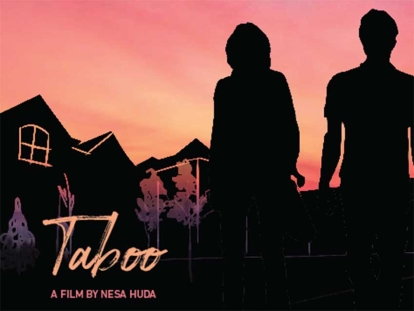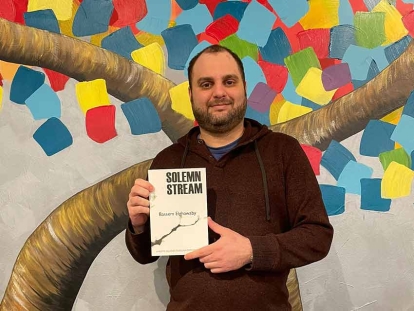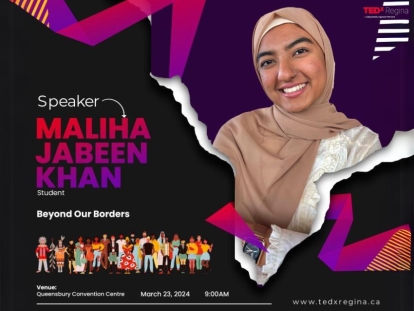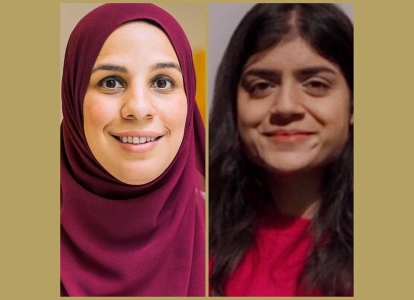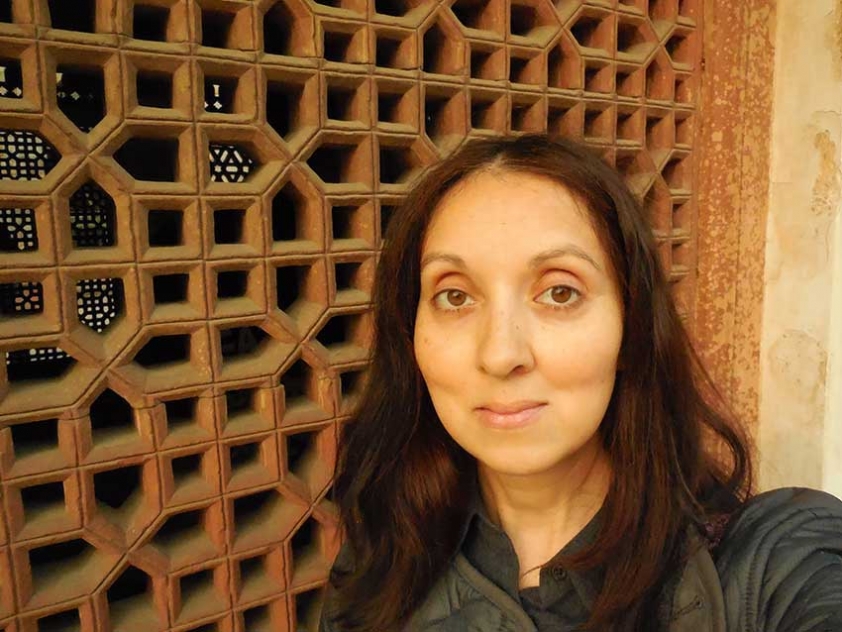 Canadian poet Rahat Kurd, photographed here in Delhi, explores the legacy of the partition of India and Pakistan in Cosmophilia.
Courtesy of Rahat Kurd
Canadian poet Rahat Kurd, photographed here in Delhi, explores the legacy of the partition of India and Pakistan in Cosmophilia.
Courtesy of Rahat Kurd
Mar
Kashmiri Canadian Poet Rahat Kurd Reflects on Faith, Loss, and Resilience in Cosmophilia
Written by Muslim LinkVancouver-based writer Rahat Kurd has recently published a collection of poetry entitled Cosmophilia. Her collection explores her personal journey as a Kashmiri Muslim Canadian woman grappling with faith, identity, history, family and the traumatic and ever present legacy of the partition of India and Pakistan. She will be in Ottawa on March 29th and in Toronto on April 9th reading from her collection. Muslim Link interviewed her about her writing.
Tell us why you chose the title Cosmophilia? What does this word mean to you and what do you hope it conveys to readers?
I chose the title COSMOPHILIA about five years before I even began to put the book together. There was an Islamic art exhibition in 2007 of the same name. I had never come across the word before and I was intrigued by it and instantly coveted it for my own purposes. And I think I want readers to feel a sense of intrigue when they see it, like they're being drawn to something unfamiliar, but possibly transformative.
It's obviously of Greek origin, via Latin, but it means 'love of ornament', which surprises a lot of people. Not 'love of the universe' or 'love of everything'. And 'love of ornament' does express something essential about Islamic art and architecture and art history, and to me it speaks with particular acuteness of the very fine Kashmiri handicraft traditions I've grown up surrounded by.
The admiration of the earth's natural beauty is common around the world, but in Kashmir there is a whole culture around expressing that beauty through skilled craft. I don't just mean that it's part of the economy. There is a deeper social and spiritual value attached to the practice, the discipline, in making something by hand that is beautiful to look at and which is meant to last, as there is in the repetition of patterns. Many of the poems in my book draw upon traditions and ideas in Islamic art and reflect on the conditions in which art gets made.
Why, as a recognized writer of prose, did you choose to write a book of poetry?
I've read and practiced writing poetry since my teens, so in that sense the book wasn't a departure. Maybe it was more of an evolution. The time felt right, as I came into contact with published poets who really wanted to know what I was writing and urged me on toward putting the collection together.
I had a conviction that these poems deserved a life outside my head, and a feeling of embracing the chance to say what only poems would allow me to say.
The poems in Cosmophilia range from reflections on personal histories of family migration and divorce to world histories from the origins of Mecca to the partition of India and Pakistan; why is it important to you as a poet to show how our personal narratives are shaped by larger movements in history?
I think I just wanted to see if I could do it. With prose, especially in political writing about world events, there's a general consensus, though of course debatable, that the more detached and analytical you can be, the stronger the work. There is a very different challenge with writing poetry - there's the phenomenon of being really shaken up by some seismic emotional shift in your life. For me, those seismic shifts demand the use of poetic language, almost spontaneously. Rage and grief and despair: poetry exists because humans have to process those emotions.
The creative or technical challenge becomes, can you pull the reader into the experience, and still leave room for them to decide what it meant? Can they gain even the flicker of a sense of how huge and devastating something like partition, or the Jammu massacre must have been? And I also wanted the poems –I’m thinking of "Return", which slowly builds up to revealing that my grandmother's parents were massacred in Jammu in 1947, as well as "Wagah Border", which is about the formal partition of India and Pakistan—to show that I didn't necessarily know if I could succeed, that wrestling with the questions and being afraid of failure was part of the process.
Like many writers with roots in colonized countries you express a love/hate relationship with English, a language brought to South Asia by colonialism, in contrast to languages you feel are more an authentic part of your religious and cultural heritage, such as Arabic, Persian, Urdu, and Kashmiri. How have you made English your own as a South Asian Muslim woman?
I think I have made English my own, in the sense that I knew that I wanted to write from an early age and persisted, principally by reading as widely and deeply as I could. That I am able to infuse my practice of English with the tones and moods I've learned from poetic traditions of the other languages you've listed has become an ongoing source of joy and creative energy.
As someone of Kashmiri descent, how has your collection been received, given that it explores the conflict in Kashmir, a conflict which many people outside of the region have very little knowledge of, and those from the region have very strong and often opposing opinions about?
Its reception on the Kashmiri issues front has been pretty quiet so far. I am hoping the work will eventually find the readers who will wish to develop a conversation around that topic.
You reveal a lot about your family's history and your personal history, including your divorce, in this collection. What advice would you give to aspiring Muslim women writers who wish to explore personal histories but also are concerned about how that may be perceived within their respective Muslim communities?
Reading what other Muslim women have written about their lives is the best, most direct way to find the necessary courage to write about yours. Trace your lineage and you will find your voice.
I've read and re-read books by Muslim feminist scholar/writers for the past two decades. I find a tremendous sense of solidarity, warmth, comfort, and frankness in the pages of Marjane Satrapi, Azar Nafisi, Fatema Mernissi, and Leila Ahmed, all of whom have wonderfully and vividly described the realities of how they grew up, and the lives of women in their families and communities.
I urge young women in particular to read the memoirs of all the writers I've mentioned above, as they contain depths of insight and perspective that are simply not available in a 600—word confessional blog post written by your friends.
All aspiring writers have to have lots of curiosity and to read constantly and across all kinds of demographic divides, for the sake of their craft—but we are lucky we live in an age where so many books by Muslim women are now available.
I have zero interest in claiming to be the first Muslim woman to write about anything or to have struggled against anything. This is very important. I see myself as contributing to, and hopefully expanding in some new directions, the body of literature which Muslim women have produced over centuries of struggle and perseverance.
Your life has spanned the dramatic growth of Canada's Muslim population, in the city you were born and raised, Hamilton, the city where you lived for several years Ottawa, and now Vancover. How much do you feel your experience growing up at a time when there were few Muslims in Canada and Canadian culture and media was not very literate about Muslims compares to young Muslims now living in post-“Little Mosque on the Prairie” Canada?
I have thought about this a lot in writing about Muslim culture. There are so many more flashing lights and buzzing noises around being Muslim now that didn't exist when I was a kid. It certainly looks, post-Little Mosque, like young Muslims might have more successful role models, more images of diverse Muslim identities, easier access to safe spaces and, one hopes, supportive and inclusive communities, at least online.
There is a real sense, I think, that there are much fewer limits on the conversations and debates it is possible to have. But most of those resources have been developed in response to a wider climate of constant suspicion and increasingly disturbing levels of violence—with normative, at times publicly tolerated, violence; some of it fuelled by hateful rhetoric coming from public officials, and not just in the build-up to the election last fall, but over the last fifteen years during the wars. And the plain fact is there is no end in sight, and we don't know how many more Muslim bodies will be targeted in air strikes and drone attacks or gun violence in US cities.
What a lot of young Muslims didn't get, growing up through all of this, was the chance to decide how much of their Muslim identities they would choose to express, if they didn't feel backed into a corner by this climate of conflict and hate. I'm writing about my early experiences in the Muslim community because crucial parts of it were defined by feeling almost completely invisible and ignored in the wider Canadian context, as if my presence didn't even register or spark the least curiosity, which would be hard to imagine now. That invisibility had its own consequences. But there was still a kind of freedom in being mostly left alone to form my own ideas about religion, without having to negotiate, bodily and discursively, the constant threat of violence as well as the actual violence associated with it.
What can participants look forward to at your reading of Cosmophilia at Octopus Books on March 29th?
I hope for it to be a celebratory night, of how poetic language can be used to evoke art in many other forms, especially when it's art made in a spirit of defiance and survival through times of war and heartbreak. I hope that participants will gain an appreciation of the really rich legacy of Islamic art history that has inspired my work, and that they will feel welcome to ask any questions they have, and take away some inspiration of their own.
To learn more about Cosmophilia visit Talonbooks here
This article was produced exclusively for Muslim Link and should not be copied without prior permission from the site. For permission, please write to info@muslimlink.ca.



